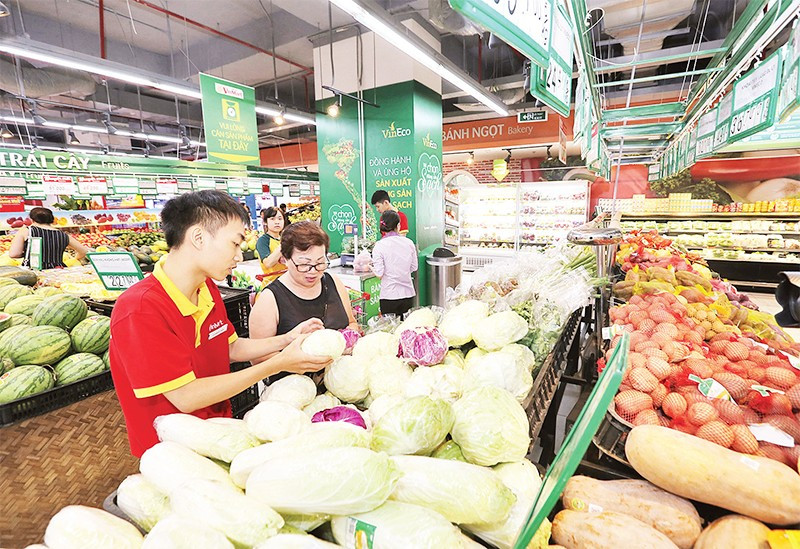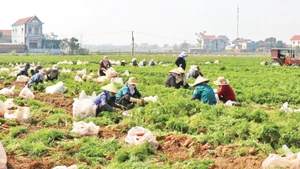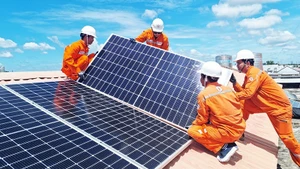Along with creating mechanisms and policies to support businesses in transitioning to green production, Vietnam also needs to focus on raising awareness and promoting consumer participation in sustainable consumption practices, thereby working with businesses to achieve sustainable results.
The Consumer Protection Law of 2023, which officially took effect on July 1, 2024, introduces the concept of sustainable consumption and clearly defines the responsibilities and obligations of consumers, businesses and regulatory agencies in promoting sustainable production and consumption, as well as developing consumer protection activities in Vietnam in general.
Green consumption becoming increasingly popular
According to Le Trieu Dung, Chairman of the National Competition Commission, sustainable production and consumption have become crucial links in ensuring the effectiveness of the sustainability process.
This is not just a legal responsibility, but also a trend and objective requirement from practice, as well as an opportunity for the business community and consumers to contribute directly to the country’s sustainable development process. In this context, consumers have been increasingly demonstrating their position, importance and decisive role in the success of this process.
In fact, green consumption and sustainable consumption are no longer strange concepts, and are gradually becoming more popular in daily life.
A survey of 14,000 people from nine countries by the IBM Institute for Business Value (IBV) showed that 90% of respondents said that the COVID-19 pandemic has changed their perspective on issues related to the environment and sustainable consumption.
Consumers are gradually turning away from and limiting the use of products from businesses that cause pollution, waste resources or have negative impacts on the environment and the community.
According to the Ministry of Industry and Trade, the demand for green consumption in Vietnam has grown at an average rate of 15% per year during the 2021-2023 period. More than 72% of Vietnamese consumers are willing to pay more for green products, indicating consumers’ growing awareness and concern for health protection and environmental issues.
In response to this trend, many spaces dedicated to green products have begun appearing in retail systems. Nguyen Thi Hai Thanh, Director of Aeon Mall Ha Dong, shared that “Aeon Mall Ha Dong has priority checkout counters for customers who don’t use plastic bags, and also provides a “rent a bag” service where customers can borrow eco-friendly bags directly at the checkout counter for 5,000 VND per bag, with the rental fee refunded when the bag is returned at the service counter.”
She added that “We have also been implementing a no-plastic-bag day programme on the first Monday of each month since 2023, as well as stopped distributing single-use plastic products and transitioned from plastic shopping cards to mobile applications.”
The WinCommerce system has also been contributing to environmental protection by implementing a series of green solutions across its WinMart/WinMart+ supermarket and mini-supermarket network.
Specifically, WinCommerce uses all biodegradable plastic bags, and it has simultaneously reduced or replaced single-use plastic materials with environmentally friendly items.
More government support needed
It can be seen that green consumption is becoming a dominant trend, creating strong impacts that force businesses to change their mindset and methods to ensure their products and services meet the needs of today’s new consumers.
In reality, many manufacturing facilities and businesses have already recognised this issue and proactively implemented timely solutions.
For example, over the past three years, Garment 10 Corporation (Garco 10) has implemented various production greening activities, such as investing in modern machinery and equipment that uses less electricity; investing in solar energy systems and rooftop power; and linking production chains in Vietnam and abroad to maximise the use of recycled and natural products.
Garco 10 General Director Than Duc Viet shared that “Greening production is no longer a matter of choice; it has now become a mandatory requirement for businesses aiming at sustainable exports. Even in the production process, coal-fired input fuels are being converted to biomass electricity fuel to ensure minimum carbon emissions. It is expected that in 2024, if all Garco 10’s projects become operational, they will help reduce carbon emissions to the environment by more than 20 thousand tonnes.”
Ta Dinh Thi, Vice Chairman of the National Assembly’s Committee for Science, Technology and Environment, stated: “Sustainable production and consumption are trends of particular importance in the sustainable development process not only in Vietnam but also regionally and globally. Recognising this, the Vietnamese National Assembly and government have proactively implemented a consistent approach to promoting sustainable production and consumption, especially in policy development and legislation. As a result, the policy framework for sustainable production and consumption is increasingly being improved.”
However, Thi also acknowledged that there are still many difficulties and obstacles ahead that hinder the swift implementation of policies and laws in practice.
Most businesses are aware of the role of sustainable production in enhancing their competitiveness and long-term development, but they still face many challenges and uncertainties in seeking, mobilising and utilising investment for green production, scientific research and technology application to create high-value, environmentally friendly products.
Businesses involved in the distribution of goods have also gradually greened their distribution processes, thus reducing intermediate packaging and waste, while using and distributing environmentally friendly products and packaging. However, these activities are not yet sustainable, with the use of plastic bags and non-degradable packaging still being common.
For their part, consumers have become more knowledgeable and increasingly prioritise green consumption. However, the prices of green products remain high relative to the general income level. Meanwhile, deceptive advertising practices and the exploitation of green product information to inflate prices are becoming more common, leading to concerns and confusion among consumers.
To keep up with sustainable production and consumption trends, Mac Quoc Anh, Vice President and Secretary General of the Hanoi Association of Small and Medium Enterprises, believes that businesses must undergo a more profound transformation.
At the same time, additional support from government agencies is needed, including mechanisms and policies that prioritise and encourage scientific research and the development of modern technologies for application in green production.
Green and clean production requires long-term and stable capital sources. Therefore, mechanisms are needed to facilitate businesses’ access to preferential funding. The government should implement solutions to encourage and prioritise greener, cleaner businesses and improve the policy framework to support companies in transitioning to green production and sustainable consumption.
Bui Thanh Thuy, Vice President and Secretary General of the Vietnam Consumer Protection Association, noted that many consumers are still not enthusiastic about green products, primarily due to their costs.
Meanwhile, there are still few investment policies that directly benefit consumers. Since this directly impacts people’s daily lives, consideration should be given to lowering prices and reducing consumption taxes on green products to make them more accessible to the public.
















